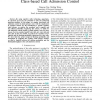Free Online Productivity Tools
i2Speak
i2Symbol
i2OCR
iTex2Img
iWeb2Print
iWeb2Shot
i2Type
iPdf2Split
iPdf2Merge
i2Bopomofo
i2Arabic
i2Style
i2Image
i2PDF
iLatex2Rtf
Sci2ools
122
click to vote
ICC
2009
IEEE
2009
IEEE
Adoption of Cognitive Radio Scheme to Class-Based Call Admission Control
Abstract--By using cognitive radio technology, opportunistic spectrum access has the potential to solve the underused spectrum problem. In this paper, we employ class-based call admission control to admit primary users with the employment of cognitive scheme. By first introducing a specific cognitive radio scheme, we analyze the secondary user's capacity and the collision probability. Employing this scheme, we build two call admission control models to admit primary users for three classes of service, namely, handoff voice calls, new voice calls and data calls. In the two models, we analyze the secondary user's capacity and the blocking probability experienced by voice calls. We show that they achieve improved blocking probability and throughput by exploiting the cognitive radio scheme. Further, we show a tradeoff between the collision probability and the blocking/throughput in the call admission control.
| Added | 18 Feb 2011 |
| Updated | 18 Feb 2011 |
| Type | Journal |
| Year | 2009 |
| Where | ICC |
| Authors | Dongyue Xue, Hui Yu, Xinbing Wang, Hsiao-Hwa Chen |
Comments (0)

